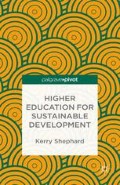Abstract
Describing the research undertaken by the author in 2013. It describes the methods employed in this research, the institutions visited and the results obtained. The chapter in particular addresses the discussions that the author had with university teachers and with those who support them in each university visited. It describes the constructivist-grounded theory research approach adopted and discusses the importance of coding in grounded theory research. The results provided are described as the constituent themes of a grounded theory for sustainability education, essentially an integrated set of conceptual hypotheses developed from empirical data. The themes emphasise the roles of three sections of university people: university teachers, academic developers and university administrators.
Access this chapter
Tax calculation will be finalised at checkout
Purchases are for personal use only
Preview
Unable to display preview. Download preview PDF.
References
Bosselmann, K. (2001). University and sustainability: compatible agendas? Educational Philosophy and Theory 33 (2), 167–186.
Charmaz, K. (2006) Constructing Grounded Theory. London: Sage.
Corbin, J., & Strauss, A. (2008). Basics of Qualitative Research: Techniques and Procedures for Developing Grounded Theory, 3rd edition. Thousand Oaks, CA: Sage.
de Bono, E. (1999) Six Thinking Hats, 2nd edition. New York: Back Bay Books.
Glaser, B.G. (1998) Doing Grounded Theory — Issues and Discussions. Mill Valley, CA: Sociology Press.
Glaser, B.G., & Strauss, A.L. (1967). The Discovery of Grounded Theory: Strategies for Qualitative Research. New York: Aldine De Gruyter.
Jickling, B., & Wals, A.E.J. (2008). Globalization and environmental education: looking beyond sustainable development. Journal of Curriculum Studies 40, 1–21.
Shephard, K. (2008). Higher education for sustainability: seeking affective learning outcomes. International Journal of Sustainability in Higher Education 9 (1), 87–98.
Shephard, K., & Furnari, M. (2013) Exploring what university teachers think about education for sustainability. Studies in Higher Education 38 (10), 1577–1590.
Shephard, K., Harraway, J., Jowett, T., Lovelock, B., Skeaff, S., Slooten, E., Strack, M., & Furnari, M. (2014) Longitudinal analysis of the environmental attitudes of university students Environmental Education Research. (In press) http://www.tandfonline.com/doi/full/10.1080/13504622.2014.913126.
Strauss, A., & Corbin, J. (1990). Basics of Qualitative Research: Grounded Theory Procedures and Techniques. Newbury Park, CA: Sage.
Author information
Authors and Affiliations
Copyright information
© 2015 Kerry Shephard
About this chapter
Cite this chapter
Shephard, K. (2015). Educational Research to Find a Way Forward: Methods and Results. In: Higher Education for Sustainable Development. Palgrave Pivot, London. https://doi.org/10.1057/9781137548412_3
Download citation
DOI: https://doi.org/10.1057/9781137548412_3
Publisher Name: Palgrave Pivot, London
Print ISBN: 978-1-349-56263-3
Online ISBN: 978-1-137-54841-2
eBook Packages: Palgrave Education CollectionEducation (R0)

